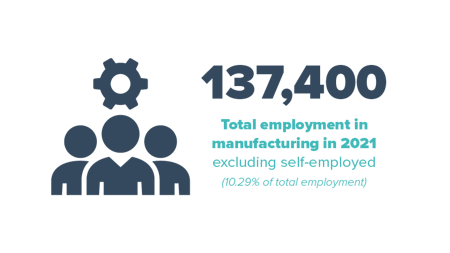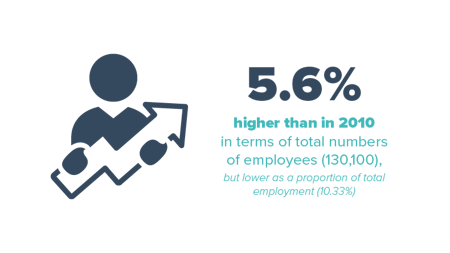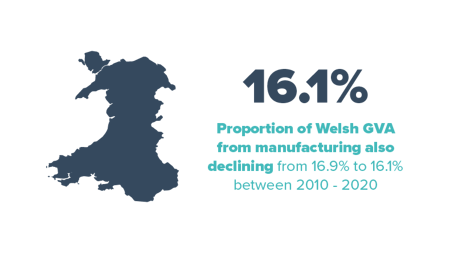Foreword
The Welsh manufacturing sector has undergone significant change over the last decade, with new technologies, the further expansion of the circular economy, and a fast-changing competitive environment only a few of the things reshaping the landscape. The majority of Welsh manufacturing businesses are micro, small, or medium[1]sized enterprises (SMEs) which face particular issues concerning supply chains, training and skills, innovation, finance, infrastructure, and sustainability. With this in mind, Federation of Small Businesses Wales sought to gain a better understanding of the challenges facing SMEs in the Welsh manufacturing sector and commissioned research in this area.
Manufacturing, and the expertise within the sector, occupy a crucial space within the Welsh economy. It stimulates innovation, growing supply chain competence and helping to answer and address some of the great challenges of the time from growing the Welsh economy to the challenges of climate change. Sustainable economic regrowth will only be possible with a thriving manufacturing sector backed by clear ambition from decision-makers.
This work raised unsurprising issues such as problems with energy, transport, and the difficulties of recruiting a sufficient number of qualified staff. However, less obvious issues such as the lack of Welsh-based suppliers for many of the resources Welsh SMEs use also arose. The example of the business faced with a multitude of simultaneous problems struck a particular chord, the need to deal with the “everything, everywhere, all at once” scenario requiring multiple policies to open headroom for firms in the sector to be able to move toward growing their business toward adaptation and strategizing for opportunities from trends in the future. Making room for manufacturing also means providing this space and time at a time of ‘everything everywhere all at once’ to build their capacity for working toward the longer term.
The current crises present opportunities to think differently, look at what we value in our SME manufacturing base, and establish what we want to build toward. It is therefore a time for a reassessment at how we can support Wales’s many excellent businesses to survive, develop, and resiliently grow for the future. We view the role of government to provide a clear steer and strategy, providing support and smarter regulation aimed at empowering smaller firms by giving them the headroom needed for growth. This will allow SMEs to look up from their immediate concerns and take in the longer-term horizon, preparing for recovery and a greener transition.
This report shines a light on the gap between short term pressures and long-term vision, and that in bridging that gap, there is significant opportunity for Welsh manufacturing businesses to place themselves on a more resilient footing, build skills and employment and prepare for future opportunities. Providing more headroom for time and resource-poor SMEs can therefore have significant economic benefits. It’s important to link long-term strategy to the tactical short-term actions and use the actions to build firms’ capacity and capabilities accordingly. Whilst the short-term needs for small businesses in crisis and long-term vision towards 2050 of Welsh Government are not in opposition, they do need to be articulated together in order to travel in the same direction and be mutually-reinforcing.
Addressing the challenges highlighted in this report undoubtedly present difficulties. However, as evidenced by the innovative approaches adopted by some of the businesses interviewed, there is room for novel and adaptable solutions. This report represents an important contribution to understanding the issues facing Welsh manufacturing SMEs.
Executive summary
A strong Welsh SME manufacturing sector is vital for the productivity, resilience, financial robustness, and development of the Welsh economy. However, there is a lack of data and understanding about how the issues currently affecting the economy influence Welsh manufacturing SMEs short- and long-term strategies.
Firms’ and Stakeholders’ Key Points Interviews with (10) firms and (6) stakeholders1 reveal that SMEs are focusing explicitly on growth as the primary objective, see innovation as a vehicle for this, and are extremely focused on staff issues currently. In contrast, stakeholders place much more emphasis on the circular economy and net zero agenda elements of sustainability.
This highlights the narrower current focus for SMEs, in an environment where short-term survival is less certain than in the pre-Covid environment in particular, and many feel that they are currently having to deal with “everything, everywhere all at once”. Stakeholders take a longer-term view, more likely influenced by trends in government policy concerning sustainability and net zero in particular. This is, however, a matter of emphasis rather than of fundamental disagreement.
The lack of Welsh-based supply chains is a key issue identified by both firms and stakeholders, playing an important role in the amount of business won by Welsh firms, the strength of the economy, and employment. Recommendations linked to actions recommended by the Social Partnership and Procurement (Wales) Act 2023 may also be of particular relevance here, promoting socially responsible outcomes pursued through supply chains, and supporting Welsh businesses and Welsh supply. Skills shortages were another area of consensus, with firms focused on more short-term basic skills areas and stakeholders focused on longer term leadership and sustainability-related skills.
Another strong area of agreement between firms and stakeholders is concerned with the lack of suitable buildings / land for expansion to meet growth aspirations, as well as availability and cost of energy. Regarding sustainability and circularity, stakeholders placed more emphasis on this, but there was consensus with SMEs (who also understood and were supportive of the sustainability agenda) of the need for government action to remove barriers to SME take-up. Issues over Feed-in Tariffs, energy infrastructure and difficulties working with the public sector, meant that there was frustration among SMEs that opportunities identified could not be exploited. Stakeholders saw potential solutions not only in better government action but also in the development of local partnerships and networks for recycling and knowledge-sharing.
Firms specifically also identify energy, land, staffing, and Brexit (lost export opportunities and / or supply chain disruption and / or staffing issues). Innovation is mainly customer-led and reactive, and consequently often currently focused on cost reduction, with finance availability often perceived as limited due to post-Brexit loss of funding sources. More generally finance is perceived as relatively less of an issue for SMEs, but mainly because of the current uncertain situation. For some there is less demand due to the post-Covid crisis inducing a wish not to take on more debt, for others in the post-Covid period they do not wish to add to already high debt levels, whilst for others the supply of finance, particularly from banks, is a barrier to their growth objectives, causing alternative debt and equity solutions to be explored.
This report also shows that for priorities to be effectively set to increase the benefits from a healthy Welsh manufacturing SME sector, policy makers need to consider the environmental contexts that have and continue to affect such SMEs and the Welsh economy more broadly.
Recommendations
Taking all of this evidence together suggests the need for a three-phase approach from policymakers in Wales. The focus should be on alleviating, in the short-term, the pain many Welsh manufacturing SMEs are facing, to give them headroom, in the longer-term aiming to build a more resilient SME-growth entrepreneurial ecosystem in which they can maximise the opportunities that the circular economy offers. The following provides the broad framework for action in short, medium and long term, followed by more specific actions to build toward each timescale.
Framework for Action
Key stats



Download
Download the full report below


